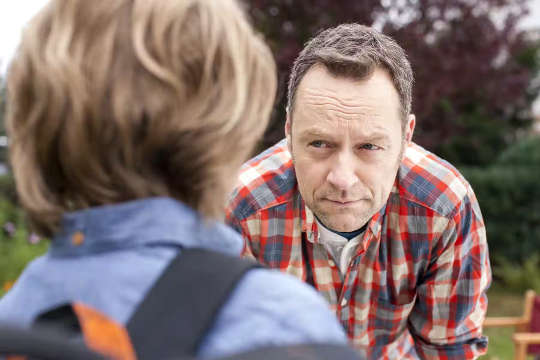
In practice, adults don’t always value truth above all else. Ashley Corbin-Teich/Image Source via Getty Images
Despite the common lesson that it’s paramount to tell the truth, adults judged children who told blunt polite truths more negatively than they did liars in a recent study my colleague and I conducted.
We asked 171 adults to watch videos of children between the ages of 6 and 15. Participants got a bit of written background identifying which children were lying and which were telling the truth.
The lies were what psychologists call prosocial, meaning they benefited someone other than the child him- or herself. For instance, they might have been trying to protect a sibling who had destroyed their bike or to be polite and tell their parent they enjoyed the birthday party organized for them.
On the other hand, when they told the truth, the children were betraying a sibling to tell on them to the parent, or they were being rude and telling the parent the party they organized was boring.
All children made both kinds of statements, both in either a blunt, obvious manner or in a subtle, less apparent way.
As you might expect, adults rated the children who told the truth in a polite but subtle way most positively. And they judged the liars as more untrustworthy than when those same kids told the truth.
However, when we asked the adult participants more broadly about the children, they rated the liars as having a generally more positive disposition when they lied to be polite than when they told the blunt truth.

Learning to tell socially acceptable lies is part of growing up – but adults might not make it clear which lies are good and which aren’t. Westend61 via Getty Images Plus
Why it matters
Lying is typically viewed negatively. In fact, being judged a liar is often seen as one of the worst characteristics you can ascribe to someone. At the same time, many smooth social interactions rely on little white lies and lies of omission.
So we were interested in understanding how children might learn how to lie and, in turn, how adults might judge kids when they tell socially acceptable lies.
Prosocial lying is more complex than lying for self-serving reasons. Parents have difficult choices to make when it comes to helping children understand this landscape.
Given our findings, it seems that adults might provide inconsistent messages in response to children’s lies. They seem to respond positively to polite liars while at the same time judging them as less trustworthy.
What’s next
The adults in our study knew when the children were lying. But much other research has shown that people are generally poor lie detectors. Our participants might have judged the liars and truth-tellers differently if they didn’t know for sure when they were watching a lie.
The kind of socialization we were interested in depends on a person’s culture and individual situation. We have yet to examine how people from different backgrounds and with various personalities would respond to lying children and in turn help them understand what is socially acceptable.
About the Author
![]()
Laure Brimbal, Assistant Professor of Criminal Justice and Criminology, Texas State University
This article is republished from The Conversation under a Creative Commons license. Read the original article.

Related Books:
Crucial Conversations Tools for Talking When Stakes Are High, Second Edition
by Kerry Patterson, Joseph Grenny, et al.
The long paragraph description goes here.Click for more info or to order
Never Split the Difference: Negotiating As If Your Life Depended On It
by Chris Voss and Tahl Raz
The long paragraph description goes here.Click for more info or to order
Crucial Conversations: Tools for Talking When Stakes Are High
by Kerry Patterson, Joseph Grenny, et al.
The long paragraph description goes here.Click for more info or to order
Talking to Strangers: What We Should Know About the People We Don't Know
by Malcolm Gladwell
The long paragraph description goes here.Click for more info or to order
Difficult Conversations: How to Discuss What Matters Most
by Douglas Stone, Bruce Patton, et al.
The long paragraph description goes here.






















